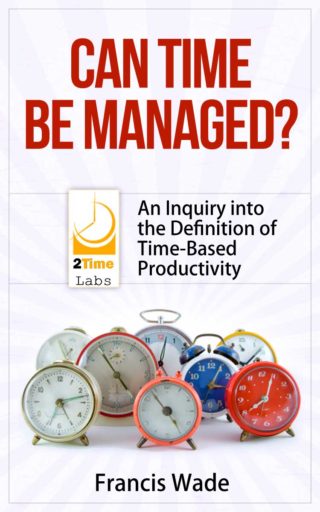Secrets of Task Management
How can you manage your tasks in a way that allows you to escape overwhelm? There are certain invisible principles you need to use to stay on top of an expanding workload. When known, they dramatically change your career for the better.
However, no-one teaches us the importance of managing our tasks skillfully. It’s usually discovered in the breach: when life isn’t working the way we want and we scramble for answers. Instead, most live on auto-pilot, never questioning why they do things the way they do. Let’s make some of these secrets conscious.
Secret 1 – Tasks Come from the Inside
What is a task? In its purest form, it belongs to a class of “psychological objects” that can’t be touched or seen, but still have an emotional weight. That’s because they come from within: each one is born when you quietly assign yourself an action to be completed in the future.
This is a self-taught practice. Around the age of seven, someone teaches you how to tell time. You realize it’s a great resource and start to create tasks which can only be executed later.
At first, all this takes place in your mind. Before long, you have developed a daily habit of creating mental commitments, even though the initial number of tasks is small. After all, that’s what a child’s parents and teachers are for: to remind them what they need to do.
But as you enter adolescence and adulthood, things change.
Secret 2 – Only Kids Should Be Using Memory
If you have ever worked with a full adult who regularly fails to do the tasks they intend, you may agree that they have a “bad memory”. This is probably true.
But it obscures a bigger problem: they are using the memory-based techniques of a child, rather than the grown-up methods of an adult. Here’s why so many get stuck.
As I mentioned, you are a self-taught task manager. However, as you grew out of your teenage years, the number of tasks increased, but your approach remained the same: to habitually use your memory.
Before long, you started to experience problems. Overwhelm crept in as you struggled to prevent promises from being broken and appointments from being missed. The harder you tried to remember, the worse things became.
Perhaps you got lucky and a parent or friend intervened, or maybe you figured out the changes you needed to make on your own. Instead of relying on memory, you began to write down all your tasks on paper or a smartphone. In either case, you stopped trying to use a Band Aid to heal an amputation, and switched your approach for the better.
The fact is, most adults have lives which are too complex to be using their memories for task management. However, most of us still complain about having a poor memory for our tasks, long after we should have given up that method.
Pro Tip: you can evaluate the capacity of a teammate by observing his/her reliance on memory for important tasks.
Secret 3 – Migrating to Better Tools
Most professionals understand the need to switch from memory to the use of written commitments (or even the employment of an administrative assistant). However, they don’t realize that this should be the first of many transformations. Research shows that your appetite to manage more tasks is insatiable: successful solutions lead to greater task loads.
These volume increases inevitably make you hit new limits. Consequently, whenever you experience symptoms of overwhelm and other task management problems, you should analyze your current combination of tools and behaviors. They must be upgraded to keep up with an increased number of tasks.
Unfortunately, this is simpler than it sounds. For example, you might recall the age when you shifted to writing down your tasks on an aid like Post-It notes. Since then, you moved on to using digital tools, but let’s imagine that you recently started noticing that familiar feeling of falling behind.
You may be tempted to believe that a return to Post-It notes would help, but here’s the surprise: it won’t. That approach was useful at a lower task volume, but cannot fit your adult life.
Now, you must perform a fresh analysis of your entire self-taught system. Look for small changes to make which together can give you brand new, added capacity. Do the research and experiment with different suggestions and technologies before settling on an upgraded approach.
But the best benefit is that now you’ll know that whenever you feel overwhelmed, the answer is never to revert to what worked for you in the past. Instead, you must go forward to adopt behaviors which are suitable for a future of even more tasks, and less overwhelm.
Can Time Be Managed? Now Available
 Good news! My publication is available as a free download. It’s a deep dive into a question that many have puzzled over – Can Time Be Managed? Or, does time management exist?
Good news! My publication is available as a free download. It’s a deep dive into a question that many have puzzled over – Can Time Be Managed? Or, does time management exist?
Many have attempted brief answers to these questions but this is the first attempt to tackle it from multiple angles, using the lens of a variety of disciplines.
It’s available as a free download by filling in the form below.
Getting Involved in App Development
2015 has been a year of change.
One of these changes marks the first time Framework has become involved in the development of a software application. While SkedPal is almost completed, I recently accepted an offer to join their Advisory Board.
It’s a unique opportunity – a chance to apply the thinking in time-based productivity in a very new way.
For more detail, and to check to see if the Beta Trial is still accepting new members, click here.
Free Promo for The Bill Book
Last week, Amazon conducted a fre promotion of my book, Bill’s Im-Perfect Time Management Adventure. It worked quite well – there were over 2260 downloads in three days and the book shot up to number one in the free category for / Time Management and /Science and Technology/General. The feedback continues to be quite positive with people sharing that “they couldn’t put it down” quite a few times. The website for my time management book can be found here.
Bill’s Im-Perfect Time Management Adventure
After a quiet start way back in March 2009, I have finally completed and published my first book. Bill’s Im-Perfect Time Management Adventure can be ordered from Amazon, and there are a number of resources that I also offer at the book’s website.
Rather than the usual how-to tome with lists, abstract principles and new ideas, I decided back in March to follow the lead of others who I admire to write a business fable.
MyTimeDesign Plus+ Now Available
Once again in 2012, I’m offering my online program to the public – MyTimeDesign Plus+. It’s a 12 lesson journey into creating an “evergreen” time management system – one that can withstand the journey of time and is open to constant renewal. For more information, access this link.
ASTD Conference Proposal Accepted
The American Society of Training and Development is the largest organization of its kind in the world, and I was recently accepted to give a speech at their annual conference in 2013 in Dallas, TX. The topic will be “How to Stop Failing at Behavior Change Training: The Case of Time Management.”
It’s a wonderful opportunity, and one that builds on our most recent work focused on helping time management coaches, professional organizers and time management trainers. Ultimately, the session will help clients learn how to develop their own time management systems.
A Sample Interactive Simulation
The countdown for the ICD Post-conference workshop in Chicago continues. The latest work product is the release of a learning simulation: Wilma Tackles Time Clutter Consulting.
It’s an interactive module in which Wilma, a professional organizer, must make the switch to time management coaching/consulting near the end of an engagement with Adam, her client. The user helps her along by making some critical choices, hopefully moving her steadily towards her final goal.
It takes about 10 minutes to complete the first time, and another 10 minutes to explore all the alternate choices.
It showcases the state of the art in e-Learning, and the latest frontier that we are exploring here at Framework. We are well on our way to the point where all of training has an e-Learning component. Between Flash interactions that require critical choices, and online classrooms using Moodle developing the best possible training in the world in the areas in which we have unique knowledge and expertise.
Free Business Webinar
I have been asked to join in as a presenter in the Productive Business Owner Teleseminar series on April 11-15.
Registration is absolutely free (amazing) and you can find out more information by signing up here.

